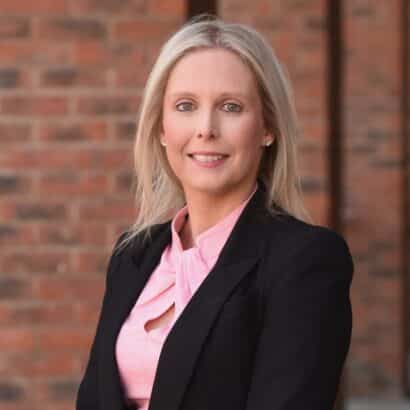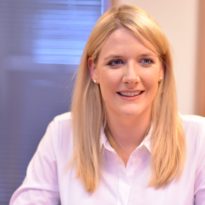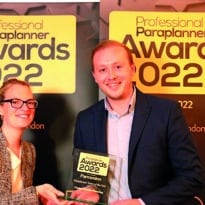Jonny Stubbs and Tarryn Gorman of Lift Financial explain how the firm has developed an effective system for attracting, motivating, developing and retaining paraplanners – including an in-house Academy and a performance related bonus scheme.
Article by Rob Kingsbury and Fiona Bond.

Jonny Stubbs - Director of Risk

Tarryn Gorman - Technical Support Team Leader
How do you incentivise and motivate a team of paraplanners? That was the question at the forefront of Jonny Stubbs mind when he joined Cheshire-based LIFT Financial in 2018 as then Head of Technical Support.
Since its inception in 2007, LIFT Financial has focused on building a business centred around growth and development. Having begun with just eight people, the firm now has close to 100 employees and has opened offices in Edinburgh and London, with its growth journey far from complete.
Jonny, who was promoted to Director of Risk in 2021, was tasked with the brief to grow the paraplanning team for the business. Over the past five years, his role has required him to bring a fresh perspective and foster a culture of motivation and development within the team.
The firm, which currently has seven paraplanners including Technical Support Team Leader Tarryn Gorman, is currently on a recruitment drive to boost the paraplanning team further, but Jonny admits that finding the right people is not an easy task. In May 2022, Jonny and Tarryn made the decision to hire an outsourced paraplanning team to meet its needs.
Jonny says: “We have a great in-house team but because we were unable to recruit externally, we made the decision to outsource which is working really well for us and has exceeded our expectations. Naturally, it comes at a cost but moving forward we will continue to combine our in-house resources with outsourcing to give us a good capacity.”
At present, the team use four to five outsourced paraplanners.
“We brought them on in much the same way we would do with an internal hire,” explains Tarryn. “We began with simpler reports before building up to more complex cases. When the reports came back, they were reviewed to ensure there were no issues and our company processes were being followed before signing them off.
“The relationship has evolved to the point it now just feels like an extension of our own team.”
Performance-related bonus
The team work on a pooled basis, with work coming through a central inbox, and Tarryn is responsible for delegating cases based on a paraplanner’s individual knowledge and workload. But Jonny and Tarryn’s passion for incentivising their team, and importantly, ensuring that LIFT retain and develop their in-house talent in a competitive market, led to the creation of a data-driven, performance-related bonus scheme.
“We wanted to create a system that encouraged our paraplanners to go above and beyond the minimum required and give them an incentive to work more efficiently,” says Jonny. “It’s not as simple as overtime, it comes down to how much paraplanners want to improve their way of working.”
The structure aims to reward paraplanners on two separate elements; working more efficiently and ultimate output. The team currently work 35 hours a week and if they are able to work more efficiently within that time frame by tweaking and improving their processes, they will be financially rewarded.
In addition, the firm rewards paraplanners for ultimate output, but Jonny admitted this element was the “toughest nut to crack”.
“The issue we faced is that no two reports are the same so how do you reward paraplanners for output based on the number of reports they produce? If one paraplanner is given easy reports and someone else is being given more complex cases, they will naturally have different output,” he says.
For Jonny and Tarryn, it was essential that the reward system was fair and to achieve that, they created a points system that would award paraplanners points on an individual report basis.
“It’s quite literally a matter of points means prizes,” jokes Jonny. “We have used time recording for over a decade and this data, along with an understanding of how long each type of report typically takes, has enabled us to create a system where a different number of points are attached to each report depending on what the subject matter is.”
Tarryn elaborates: “There’s a big difference between an ISA top-up report and a pension switch report. We needed to devise a way to ensure that we were allocating points fairly so they weren’t issued on the number of reports but rather the complexity of the report.
“For people to buy into it and be motivated, it has to be fair. It simply wouldn’t work if someone felt that someone else was getting more points because they got a better deal.”
The firm relied upon its data analyst, formerly a paraplanner for the team, to collate the data and create the system. Paraplanners have to meet a minimum number of points per week and anything over and above that level receives a bonus.
To allow paraplanners to keep track of their points and bonuses, LIFT has devised a personal dashboard, where paraplanners can access their score and see how close they are to receiving a bonus – a system that Tarryn says has worked brilliantly in motivating the team.
Training and development
The success of the reward system is testament to the firm’s ethos around career progression and development. In 2011, LIFT launched the LIFT Academy to support school leavers and graduates on the path to becoming Chartered Financial Planners, with a five-year training scheme. It entails a bespoke and structured training programme, including exams and work experience as well as coaching by members of the team.
They begin their training in administration and are gradually provided with exposure to elements of the paraplanning role, says Tarryn, with simple reports such as ISA top ups. When they progress to the paraplanning team as a trainee, Tarryn is responsible for helping them develop their knowledge and competency and people are recognised and rewarded for their creativity. She expects two paraplanners to join the team later this year as they progress through the Academy.
“It’s a gradual signing off process until they pass as a fully-fledged paraplanner,” explains Tarryn. “There’s no timescale, it’s down to the individual and what works for them and their knowledge. Usually, we expect paraplanners to be Diploma qualified.”
As part of their progression, those in the Academy are made protection advisers first as a way of “cutting their teeth”. It provides them with the ability to hold their own meetings and build their softer skills. However, if trainees feel the adviser route is not for them, LIFT provides flexibility, allowing them to carve out a career in paraplanning.
Jonny says: “As a firm, we’re quite flexible with our Academy – people can decide not to pursue the Chartered Financial Planning route and move to paraplanning if they prefer and we support that and their career progression. Ultimately, we just want to keep good people.”
Women in paraplanning
Access to support and training has also given rise to more women entering the business.
Tarryn says: “What we are seeing is more women coming through the ranks in financial advice and becoming advisers. We have a female paraplanner on the team, who began as an administrator and who is now close to becoming an adviser as part of the Academy.
“What is also really nice to see is that more women are coming through and staying in paraplanning as it becomes a career in its own right.”
Jonny adds: “We’ve got three advisers who are women and we have two more in the Academy scheme and potentially another joining later this year. The financial services industry is dominated by men but we are trying to gradually change that.”
Biographies
Jonny joined LIFT Financial in 2018 as Head of Technical. He was appointed Head of Risk in 2021 as part of LIFT’s creation of a Senior Leadership team. In his role, Jonny is responsible for ensuring the LIFT group meets all its regulatory responsibilities, as well as providing the technical support that the business needs in terms of compliance and paraplanning.
See also: Managing a team through a crisis
Tarryn joined LIFT in 2016 as a paraplanner before being promoted to senior paraplanner and Technical Support Team Leader in 2021. Tarryn’s aspiration was to be in a managerial position, rather than pursue a career in advice and she is responsible for overseeing and managing the team as well as supporting the firm’s Financial Planners.




























